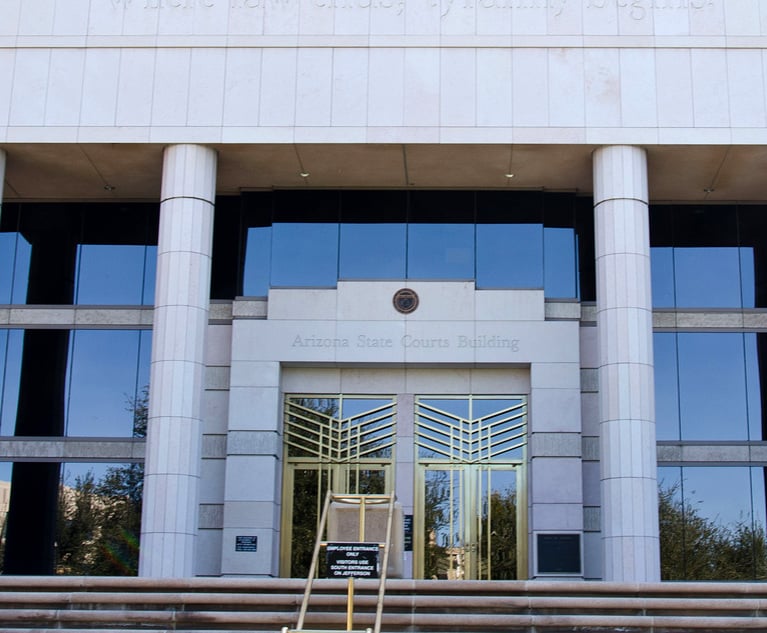Out-of-Town Firms Hire For Industry Expertise in Boston Push
As Boston booms, out-of-town Am Law 200 firms are making niche hires targeted at certain industry expertise.
September 10, 2018 at 04:58 PM
4 minute read
The original version of this story was published on The Legal Intelligencer
 Boston Harbor and Financial District at sunset. Photo: Marcio Jose Bastos Silva/Shutterstock.com
Boston Harbor and Financial District at sunset. Photo: Marcio Jose Bastos Silva/Shutterstock.com
Boston's hot legal market is keeping law firm recruiters busy, with a number of firms from outside the city adding partners in recent weeks to tap into targeted client bases. The growing demand for the region has some suggesting firms need increased specialization—rather than a generalist approach—to compete for clients and talent.
Industry watchers have pointed to the growing pool of entrepreneurs in Boston as a source of all this movement, as the area's health care, biotechnology, life sciences and technology sectors grow, and its private equity market strengthens.
Pepper Hamilton and Saul Ewing Arnstein & Lehr, both based in Pennsylvania, are some of the most recent firms to make notable lateral moves in Boston, adding to specific industry-focused practices each firm is looking to grow.
Last week, Pepper Hamilton announced that it had recruited Miranda Hooker, a former assistant U.S. attorney from the health care fraud unit of the U.S. Attorney's Office for the District of Massachusetts. She is now a partner in the firm's health sciences department, a multidisciplinary group in which she will focus on government investigations, health care fraud and abuse, and internal corporate investigations.
In July, Pepper Hamilton brought on partner Callan Stein from Barrett & Singal in Boston, also in the health sciences department. Like Hooker, he focuses on white-collar defense within the health care industry, as well as internal investigations, corporate and commercial litigation and health care litigation.
“We have a really strong and nationally recognized white-collar litigation practice nationwide and we think Boston is a natural place to grow because of our expertise in the firm in the health care industry,” said Todd Feinsmith, partner in charge of Pepper Hamilton's Boston office, which now has about 40 lawyers. “Boston is a leader, a worldwide leader, in biotech, life science, medical devices and all aspects of the health care industry.”
Also this past summer, Saul Ewing hired two partners from Boston-based Mintz Levin Cohn Ferris Glovsky and Popeo, Jeffrey Robbins and Joseph Lipchitz, who added a First Amendment and media practice to the firm. In addition to media clients, Robbins and Lipchitz brought clients in the health care and higher education spaces to Saul Ewing as well. They followed international tax and corporate partner Steven Eichel, who joined Saul Ewing's 16-lawyer Boston office in June, coming from Sullivan & Worcester.
“We've worked real hard to grow that office with quality lawyers,” Saul Ewing managing partner Barry Levin said. Seven years after his firm planted roots in that city, through its acquisition of local boutique Dionne & Gass, “we continue to move toward a full-service office in Boston,” he said.
Meanwhile, Pittsburgh-based Am Law 200 firm Eckert Seamans Cherin & Mellott added two litigation partners from McCarter & English to its Boston office in the spring, as well as an associate. Richard Briansky and Amy Hackett both focus on consumer financial services, construction and real estate, among other complex commercial litigation matters.
Boston's lateral market has been very active in the last two years, with Kirkland & Ellis, Hogan Lovells, Womble Bond Dickinson and Quinn Emanuel Urquhart & Sullivan among those opening up shop in the city. Polsinelli and Goodwin Procter also added to their Boston offices this year. And Hinshaw & Culbertson recently reaffirmed its commitment to the market by moving its 25 Boston lawyers into a new space under a 12-year lease.
Aside from the hot industries in the city, the lawyers themselves are a draw as well, Feinsmith noted.
“The talent pool in Boston is incredible. It's a university town and we have some of the best universities in the world, some of the best hospitals in the world,” he said. “Law firms around the country have realized that, and they've been coming here with increasing frequency in the last five to 10 years.”
As a result, Feinsmith said, it's become a “buyers' market” for clients, and law firms will have to build out a particular expertise to get their share of it. “To compete as a generalist in this market is going to be difficult,” he said.
READ MORE:
How Boston Became a Beacon on the Hill to Big Law
Mintz Levin Pair Join Saul Ewing in Boston, Finding 'Spirit' and Lower Rates
This content has been archived. It is available through our partners, LexisNexis® and Bloomberg Law.
To view this content, please continue to their sites.
Not a Lexis Subscriber?
Subscribe Now
Not a Bloomberg Law Subscriber?
Subscribe Now
NOT FOR REPRINT
© 2025 ALM Global, LLC, All Rights Reserved. Request academic re-use from www.copyright.com. All other uses, submit a request to [email protected]. For more information visit Asset & Logo Licensing.
You Might Like
View All
The Law Firm Disrupted: With KPMG's Proposed Entry, Arizona's Liberalized Legal Market is Getting Interesting

Big Company Insiders See Tech-Related Disputes Teed Up for 2025
Trending Stories
- 1President-Elect Donald Trump Sentenced to Unconditional Discharge
- 2JCPenney Customer's Slip-and-Fall From Bodily Substance Suit Best Left for a Jury to Decide, Judge Rules
- 3Products Liability: The Absence of Other Similar Claims—a Defense or a Misleading Effort to Sway a Jury?
- 4529 Accounts Are Not Your Divorce Piggybank
- 5Meta Hires Litigation Strategy Chief, Tapping King & Spalding Partner Who Was Senior DOJ Official in First Trump Term
Who Got The Work
Michael G. Bongiorno, Andrew Scott Dulberg and Elizabeth E. Driscoll from Wilmer Cutler Pickering Hale and Dorr have stepped in to represent Symbotic Inc., an A.I.-enabled technology platform that focuses on increasing supply chain efficiency, and other defendants in a pending shareholder derivative lawsuit. The case, filed Oct. 2 in Massachusetts District Court by the Brown Law Firm on behalf of Stephen Austen, accuses certain officers and directors of misleading investors in regard to Symbotic's potential for margin growth by failing to disclose that the company was not equipped to timely deploy its systems or manage expenses through project delays. The case, assigned to U.S. District Judge Nathaniel M. Gorton, is 1:24-cv-12522, Austen v. Cohen et al.
Who Got The Work
Edmund Polubinski and Marie Killmond of Davis Polk & Wardwell have entered appearances for data platform software development company MongoDB and other defendants in a pending shareholder derivative lawsuit. The action, filed Oct. 7 in New York Southern District Court by the Brown Law Firm, accuses the company's directors and/or officers of falsely expressing confidence in the company’s restructuring of its sales incentive plan and downplaying the severity of decreases in its upfront commitments. The case is 1:24-cv-07594, Roy v. Ittycheria et al.
Who Got The Work
Amy O. Bruchs and Kurt F. Ellison of Michael Best & Friedrich have entered appearances for Epic Systems Corp. in a pending employment discrimination lawsuit. The suit was filed Sept. 7 in Wisconsin Western District Court by Levine Eisberner LLC and Siri & Glimstad on behalf of a project manager who claims that he was wrongfully terminated after applying for a religious exemption to the defendant's COVID-19 vaccine mandate. The case, assigned to U.S. Magistrate Judge Anita Marie Boor, is 3:24-cv-00630, Secker, Nathan v. Epic Systems Corporation.
Who Got The Work
David X. Sullivan, Thomas J. Finn and Gregory A. Hall from McCarter & English have entered appearances for Sunrun Installation Services in a pending civil rights lawsuit. The complaint was filed Sept. 4 in Connecticut District Court by attorney Robert M. Berke on behalf of former employee George Edward Steins, who was arrested and charged with employing an unregistered home improvement salesperson. The complaint alleges that had Sunrun informed the Connecticut Department of Consumer Protection that the plaintiff's employment had ended in 2017 and that he no longer held Sunrun's home improvement contractor license, he would not have been hit with charges, which were dismissed in May 2024. The case, assigned to U.S. District Judge Jeffrey A. Meyer, is 3:24-cv-01423, Steins v. Sunrun, Inc. et al.
Who Got The Work
Greenberg Traurig shareholder Joshua L. Raskin has entered an appearance for boohoo.com UK Ltd. in a pending patent infringement lawsuit. The suit, filed Sept. 3 in Texas Eastern District Court by Rozier Hardt McDonough on behalf of Alto Dynamics, asserts five patents related to an online shopping platform. The case, assigned to U.S. District Judge Rodney Gilstrap, is 2:24-cv-00719, Alto Dynamics, LLC v. boohoo.com UK Limited.
Featured Firms
Law Offices of Gary Martin Hays & Associates, P.C.
(470) 294-1674
Law Offices of Mark E. Salomone
(857) 444-6468
Smith & Hassler
(713) 739-1250









